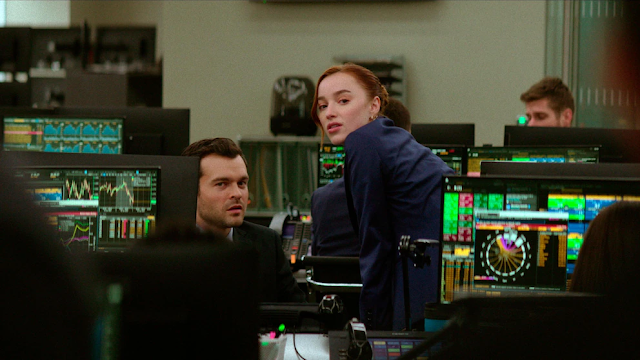Anybody in my private life or anybody who reads much of my critical writing understands how much I love a taut erotic thriller with two stellar lead performances, whether it be to the extent that the quality is not exactly all the way there and the thing can be enjoyed as a melodramatic farce or whether indeed the film is of a high watermark and the sexual dynamics and writing fuel a back and forth mind game drama. Fortunately with Chloe Domont’s directorial debut Fair Play, we are dealing with the latter.
Set in the world of high stakes finance Fair Play is a strikingly simple character study built around huge post film dinner conversations with a very simple and pivotal inciting incident, as we follow a young and passionate newly engaged couple Emily and Luke who work for the same firm and have kept their relationship a secret from the company, over the course of the downfall of their relationship as Emily is promoted and Luke’s career flounders. It’s an ingenious starting concept and one that allows for a film filled with effectively delivered gender politics and a ratcheting tension as a series of gradually more and more depraved actions and dialogues consume the couple. Chloe Domont writes and directs here with such an incredibly assured hand that this doesn’t feel like a debut at all, the doling out and slow build of anger, hatred and disintegration in the relationship is a major strong suit of the screenplay and directorially Domont too keeps the film well placed (with the editing of Franklin Peterson) and frequently visual, whereas I can very easily see a version of this film that comes off very stagey, on the other hand I can very easily see a Patrick Marber Closer styled stage play version of the film. All this is to say of course that the film primarily is based around brief glances and extended dialogues between our central couple in a character study fashion, however the film does have a neat and effective overall narrative that removes any notions of this film simply being a series of screaming matches. The film too goes beyond Emily and Luke from time to time as we focus on the business relationships the two have with their immediate superiors played by Eddie Marsan and Rich Sommer, who both offer great turns with Marsan offering a lot more menace and Sommer offering a polite ‘typical finance guy’ turn that offers a variety of characterisation in the firm to not have ensemble scenes reek of Emily being thrown into an unrealistic world of chauvinistic stereotypes (although Domont effectively deploys this side of the industry with subtlety rather than broad strokes).
However the
film is billed around and made successful by its two lead performances from
Phoebe Dynevor and Alden Ehrenreich as Emily and Luke respectively. Both turns
require something different entirely from their actors and although I think you
might say when it comes to the gradual downfall and eventual pity and
melodramatic nature of Luke’s final scenes that it is Ehrenreich who has the
bigger arc, I personally found the more subtle work of Dynevor to be the films
undoubted strongest selling point. True, the script demands Ehrenreich go more
and more over the top as the film continues, again regrettably butting heads
with the subtle and effective build of the films first three quarters more or
less, but it is Dynevor who manages somehow to make us believe that this powerful
woman would indeed remain with what becomes rather swiftly a rather unlikable individual.
I know of course in real life great, beautiful and intelligent career women end
up in relationships with absolute wastes of space all the time, however as the
film grows more and more verbally and even physically violent, the relationship
continuing remains believable drawing a tight rope walk between this film
remaining the relationship drama it is, or taking a route that the film toys
with a few times of becoming a more traditional erotic thriller with a
murderous edge consuming the tale. Instead Domont stays with the truth, in a
matter of speaking, and allows her film to culminate in an effective and
dynamic powerplay between Dynevor and Ehrenreich, who more than bring the goods
in regards to their two wonderful performances.
A slick, sexy, fierce and intelligent 8/10 thriller that although loses its slow-build handle of events as the films reaches it climax, overall the film worked for me a lot. The ending even I feel will be something I will enjoy more now I know the arc of the film and how far it does indeed go. This is incredibly assured writing and directing from Domont bolstered by two sensational performances who follow the ebbs and flows of their widely shifting arcs with a believability and graduality that makes this film work as well as it does. Fair Play is indeed a taut thriller informed by sex and with an integral sexuality in its narrative, rather than the other way around. A great debut for Domont, a film-maker I await the difficult second film of eagerly.
P.S. Was it just me who took a few scenes to figure out whether or not Eddie Marsan’s accent work in this film was good or not? Great performance, but it did take me a couple of scenes I have to admit.
- - Thomas Carruthers




0 Comments